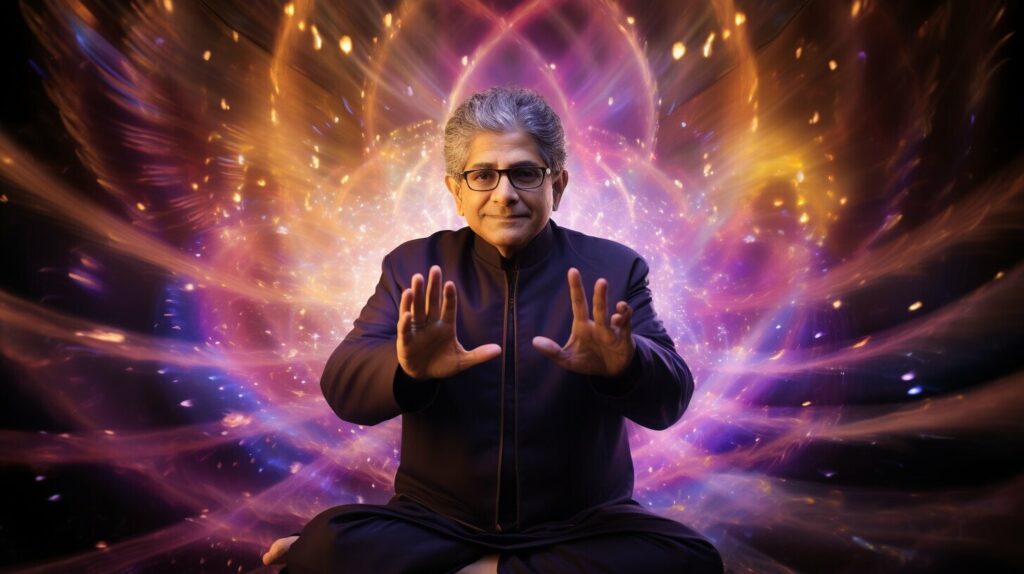Quantum healing techniques offer a fascinating approach to understanding the connection between our thoughts, beliefs, and overall well-being. Coined by Deepak Chopra, quantum healing suggests that our consciousness can influence the flow of information between cells and organs, ultimately impacting our health. While quantum healing is not meant to replace mainstream medicine, it aims to uncover the root causes of illness and take proactive steps towards prevention. Research in parapsychology and neuroscience has provided evidence that consciousness plays a role in health and healing. Quantum healing encompasses a range of practices such as meditation, yoga, and holistic healing. However, it is important to approach quantum healing with caution as it remains controversial and has been criticized as pseudoscience. It is crucial to maintain traditional medical treatment alongside any exploration of quantum healing. Some precautions include the use of hypnosis to access past lives and connect with the subconscious and spiritual aspects of life. While there have been reports of positive experiences and healing effects associated with quantum healing, further concrete evidence is required. Overall, quantum healing is considered a pseudoscientific approach that has been widely debunked by the scientific community.
Key Takeaways:
- Quantum healing explores the connection between thoughts, beliefs, and overall well-being.
- It does not replace mainstream medicine but aims to understand the root causes of illness.
- Research suggests that consciousness can influence health and healing.
- Practices such as meditation, yoga, and holistic healing are part of quantum healing techniques.
- Quantum healing is controversial and criticized as pseudoscience, so caution is advised.
What is Quantum Healing?
Quantum healing encompasses a range of alternative healing methods and holistic practices that aim to address health and well-being from a mind-body perspective. It is a concept that suggests our thoughts, beliefs, and attitudes play a significant role in our overall health and can have a direct impact on our well-being. Coined by Deepak Chopra, quantum healing involves the idea that our consciousness can influence the flow of information between cells and organs, ultimately affecting our physical and mental health.
While quantum healing is not intended to replace mainstream medicine, it offers a complementary approach to understanding the roots of illness and taking proactive steps towards prevention. Research in parapsychology and neuroscience has shown that our consciousness can affect our health and healing processes, highlighting the potential power of our minds in promoting well-being.
Quantum healing techniques encompass a variety of practices, including meditation, yoga, and holistic healing. These practices aim to foster a connection between the mind and body, emphasizing the importance of balancing our mental, emotional, and physical states for optimal health. By incorporating these techniques into our daily lives, we can cultivate a sense of awareness, inner peace, and harmony that contributes to our overall well-being.

However, it’s important to note that quantum healing is a controversial approach and is often criticized as pseudoscience. The scientific community widely debunks the claims associated with quantum healing due to a lack of scientific evidence and empirical support. It’s crucial to approach quantum healing with caution and in conjunction with traditional medical treatment, as abandoning evidence-based practices can have detrimental effects on our health.
Consciousness-Based Healing and Quantum Healing Therapies
Consciousness-based healing is another aspect of quantum healing that focuses on utilizing the power of our consciousness to promote healing and well-being. This approach includes practices such as hypnosis, which can be used to access past lives and connect with subconscious and spiritual aspects of our lives. By exploring these deeper levels of consciousness, individuals may gain insight, clarity, and potential healing benefits.
While there are reports of positive experiences and healing effects associated with quantum healing, more concrete evidence is needed to validate these claims. It is essential to approach personal experiences with an open mind but also maintain a critical perspective, considering the lack of empirical evidence supporting quantum healing.
| Key Points: | Quantum Healing |
|---|---|
| Definition: | A range of alternative healing methods and holistic practices that address health and well-being from a mind-body perspective. |
| Coined by: | Deepak Chopra |
| Focus: | Utilizing consciousness to influence information flow between cells and organs. |
| Techniques: | Meditation, yoga, holistic healing |
| Controversy: | Criticized as pseudoscience; lacks scientific evidence. |
The Origins of Quantum Healing
Quantum healing was coined by the renowned author and speaker Deepak Chopra, who introduced the concept of consciousness-based healing as a means to improve overall well-being. Chopra’s work revolutionized the field of alternative medicine, highlighting the connection between the mind, body, and spirit in promoting health and healing.
Deepak Chopra’s approach to quantum healing is rooted in the belief that our thoughts, beliefs, and attitudes can have a direct impact on our physical and emotional well-being. He suggests that by cultivating positive thoughts, practicing mindfulness, and adopting healthy lifestyle choices, we can tap into the inherent healing abilities of our own consciousness.

The Power of Consciousness-Based Healing
“Consciousness-based healing is not a replacement for mainstream medicine, but rather an integrative approach that seeks to understand the underlying causes of illness and take preventative measures.”
Deepak Chopra’s teachings emphasize the interconnectedness of mind, body, and spirit, highlighting the importance of addressing all aspects of human existence to achieve optimal well-being. By harnessing the power of consciousness and focusing on self-awareness, individuals can tap into their own inner healing capabilities and make positive changes in their lives.
While consciousness-based healing has gained popularity in recent years, it is important to approach it with caution and in conjunction with traditional medical treatment. The scientific community has criticized quantum healing as pseudoscience, citing the lack of empirical evidence supporting its claims. It is essential to consult with healthcare professionals and rely on evidence-based practices when it comes to medical decisions.
| Key Points | Description |
|---|---|
| Deepak Chopra | The acclaimed author and speaker who coined the term quantum healing and introduced consciousness-based healing as a means to promote overall well-being. |
| Consciousness-Based Healing | The concept that emphasizes the role of thoughts, beliefs, and attitudes in influencing our physical and emotional well-being. It encourages the integration of mind, body, and spirit for optimal health. |
| Integrative Approach | Consciousness-based healing is not meant to replace mainstream medicine but rather complement it. It seeks to address the root causes of illness and take preventative measures. |
| Critical Reception | While consciousness-based healing has gained popularity, it has been criticized as pseudoscience by the scientific community due to the lack of empirical evidence supporting its claims. |
Quantum healing, as introduced by Deepak Chopra, offers a holistic approach to health and well-being, considering the interplay between the mind, body, and spirit. By harnessing the power of consciousness, individuals can potentially enhance their overall wellness, but it is important to tread carefully and not abandon traditional medical treatment. The origins of quantum healing can be traced back to the pioneering work of Deepak Chopra, who revolutionized the field of alternative medicine with his concept of consciousness-based healing.
Next up, we will delve into the scientific basis behind the quantum healing approach, exploring research in parapsychology and neuroscience that sheds light on the potential impact of consciousness on health and healing.
Understanding the Quantum Healing Approach
Scientific research in parapsychology and neuroscience has shed light on the connection between consciousness and its influence on health and healing, providing a basis for the quantum healing approach. Quantum healing is a concept that suggests our thoughts, beliefs, and attitudes play a role in our health and well-being. Coined by Deepak Chopra, this approach proposes that our consciousness can influence the flow of information between cells and organs in our body.
Quantum healing is not intended to replace mainstream medicine, but rather to understand the underlying causes of illness and take proactive steps toward prevention. It explores the idea that our state of mind and the energy we emit can impact our overall health. By cultivating positive thoughts, beliefs, and emotions, we can supposedly enhance our well-being and facilitate healing.
Several scientific studies conducted in the fields of parapsychology and neuroscience have provided evidence for the connection between consciousness and health. Research suggests that practices like meditation, which encourage a state of deep relaxation and mental focus, can have physiological effects on our body, such as reducing stress levels and promoting overall wellness. Holistic approaches that integrate the mind, body, and spirit, are also considered part of the quantum healing paradigm.

The Role of Parapsychology and Neuroscience
Parapsychology explores phenomena beyond the realm of traditional scientific explanation, such as telepathy, precognition, and psychokinesis. While controversial, parapsychological research has contributed to our understanding of consciousness and its potential influence on health.
Neuroscience, on the other hand, investigates the complex workings of the brain and the mind-body connection. It has identified neural pathways and mechanisms through which consciousness can impact physical health and healing processes.
While quantum healing remains a topic of debate and is often criticized as pseudoscience, it has garnered interest from individuals seeking alternative approaches to wellness. It is important to approach quantum healing with caution and not abandon traditional medical treatment. More concrete evidence is needed to validate its claims and ensure its efficacy.
| Pros | Cons |
|---|---|
| Offers a holistic approach to health and well-being | Controversial and criticized as pseudoscience |
| Focuses on the mind-body connection and consciousness | Not a substitute for mainstream medical treatment |
| Encourages personal empowerment and self-care | Lack of concrete scientific evidence |
Quantum healing, with its emphasis on consciousness and energy, continues to be a subject of intrigue and research. As the understanding of parapsychology and neuroscience evolves, there may be more insights into the potential connection between consciousness and health. However, until then, it is essential to approach quantum healing with an open mind, maintaining a balanced view and integrating it with evidence-based medical practices for optimal well-being.
Quantum Healing Techniques and Practices
Quantum healing incorporates a variety of techniques and practices, such as meditation, yoga, and holistic healing, to promote overall well-being and improve the mind-body connection. These practices have been used for centuries and have gained popularity in recent years due to their potential to support physical, mental, and emotional health.
Meditation, for example, is a powerful tool that allows individuals to quiet the mind and cultivate a state of inner peace. By focusing on the breath or a specific object of attention, meditation helps reduce stress, enhance concentration, and promote a sense of calm. Regular meditation practice has been linked to numerous health benefits, including reduced anxiety, improved sleep quality, and increased self-awareness.
Yoga, on the other hand, combines physical postures, breathing exercises, and meditation to enhance flexibility, strength, and balance. It not only provides a great workout for the body but also helps calm the mind and cultivate mindfulness. By practicing yoga regularly, individuals can improve their physical fitness, relieve muscle tension, and promote relaxation.
Another practice commonly associated with quantum healing is holistic healing, which takes a holistic approach to wellness by addressing the physical, mental, emotional, and spiritual aspects of a person. This may include therapies such as acupuncture, energy healing, herbal medicine, and nutrition. Holistic healing aims to restore balance within the body, promote self-healing, and support overall well-being.

| Quantum Healing Techniques and Practices | Benefits |
|---|---|
| Meditation | Reduces stress, improves focus, promotes relaxation |
| Yoga | Enhances flexibility, strength, and balance, cultivates mindfulness |
| Holistic Healing | Addresses physical, mental, emotional, and spiritual aspects of health |
It is important to note that while Quantum Healing Techniques and Practices can be beneficial for many individuals, they should not replace traditional medical treatment. It is always advisable to consult with healthcare professionals and follow their advice for any specific health concerns or conditions. Quantum healing can complement conventional medicine by promoting overall well-being and supporting the body’s natural healing processes.
Takeaway
Quantum healing techniques such as meditation, yoga, and holistic healing offer individuals a holistic approach to wellness and self-care. These practices can help promote relaxation, improve physical fitness, and support overall well-being. However, it is essential to approach quantum healing as a complementary approach to traditional medical treatment and seek professional guidance when needed. By integrating these techniques into our lives, we can cultivate a greater sense of balance, harmony, and vitality.
The Controversy Surrounding Quantum Healing
Quantum healing has been met with skepticism and criticism from the scientific community, often being labeled as pseudoscience due to its lack of concrete evidence and scientific support. While proponents of quantum healing argue that our thoughts and consciousness can influence our health, critics dismiss it as nothing more than wishful thinking.
One of the main points of contention is the lack of empirical data to support the claims made by quantum healing practitioners. Traditional medical treatments, such as medications and surgeries, have undergone rigorous scientific testing and evaluation to determine their efficacy. In contrast, quantum healing methods often rely on anecdotal evidence and personal experiences, which are subjective and difficult to prove objectively.
Additionally, the scientific community has raised concerns about the potential dangers of relying solely on quantum healing practices. While it is true that positive experiences and healing effects have been reported, it is important to consider that these outcomes could be attributed to a placebo effect or natural healing processes rather than the specific techniques employed in quantum healing.
| Pseudoscience Claims | Scientific Critique |
|---|---|
| Quantum healing can cure any illness. | There is no scientific evidence to support the claim that quantum healing can cure all illnesses. |
| Consciousness can directly influence cellular processes. | While consciousness may have an impact on overall well-being, there is no empirical evidence to suggest that it can directly influence specific cellular processes. |
| Quantum healing can replace traditional medical treatments. | Quantum healing should not be seen as a replacement for traditional medical treatments but rather as a complementary approach to overall health and well-being. |
While quantum healing may hold promise and be appealing to those seeking alternative approaches to healthcare, it is essential to approach it with caution and maintain a balanced perspective. The best course of action is to incorporate quantum healing practices alongside traditional medical treatments, ensuring that one does not abandon evidence-based therapies in favor of unproven methods.

While exploring quantum healing, it is important to exercise caution and consider factors such as the use of hypnosis, accessing past lives, connecting with spiritual aspects, and the need for tangible evidence to support claims of healing. Hypnosis, a common technique used in quantum healing, allows individuals to enter a state of deep relaxation and heightened suggestibility. It is essential to work with trained and reputable practitioners who adhere to ethical guidelines and prioritize the well-being of their clients.
Accessing past lives is another aspect of quantum healing that some individuals may explore. It involves regression therapy to uncover memories and experiences from previous lifetimes. This process can be emotionally intense, and it is crucial to engage in this practice with the support of a qualified therapist to ensure a safe and productive experience.
Connecting with spiritual aspects is also central to quantum healing. Many people find solace and guidance in incorporating spiritual practices, such as meditation, prayer, or energy healing, into their healing journey. However, it is important to approach these practices with an open mind and a discerning attitude, ensuring that they align with one’s personal beliefs and values.
Quantum healing is often criticized for its lack of concrete evidence to substantiate claims of healing. While personal experiences and anecdotal evidence can be compelling, it is essential to seek scientific research and empirical data to support the efficacy of quantum healing techniques. As more studies are conducted and evidence is gathered, a clearer understanding of the potential benefits and limitations of quantum healing may emerge.
| Precautions and Considerations in Quantum Healing | Benefits |
|---|---|
|
|
Personal Experiences and Reported Healing Effects
Many individuals have reported positive experiences and healing effects through the practice of quantum healing, sharing stories of improved well-being and overall health. Quantum healing techniques, such as meditation, yoga, and holistic healing, have been embraced by those seeking alternative and complementary approaches to traditional medical treatment. These practices aim to tap into the power of the mind-body connection, harnessing the potential of consciousness to promote healing and wellness.
One of the key aspects of quantum healing is its emphasis on addressing the root causes of illness and disease, rather than solely treating symptoms. By exploring the underlying beliefs, emotions, and energetic imbalances that contribute to health issues, individuals have reported transformative experiences and lasting healing effects.
For example, individuals who have incorporated meditation into their daily routine have found that it not only helps reduce stress and anxiety but also enhances their overall sense of well-being. The practice of mindfulness, a key component of quantum healing, allows individuals to cultivate a deeper connection with their inner selves, leading to greater self-awareness and a profound sense of peace.

Moreover, holistic healing approaches, which encompass various modalities such as acupuncture, herbal medicine, and energy healing, have been credited with promoting physical, mental, and emotional balance. These practices are believed to restore the body’s natural healing abilities and support its innate capacity for self-repair.
While personal experiences provide compelling anecdotes about the potential benefits of quantum healing, it is important to note that more concrete scientific evidence is needed to fully understand and validate these claims. As with any alternative or complementary approach, it is crucial to approach quantum healing with an open mind, while also taking into consideration the advice and guidance of healthcare professionals.
Debunking Quantum Healing
Quantum healing has been widely debunked by the scientific community, with experts pointing out its lack of scientific evidence and the absence of rigorous research supporting its claims. Critics argue that the concept of quantum healing is based on pseudoscience and lacks credibility.
The scientific community emphasizes the need for concrete and replicable evidence to support any claims related to health and healing. While personal experiences and anecdotes may suggest positive effects from quantum healing, these subjective accounts are not sufficient to establish its effectiveness.
Furthermore, quantum healing often involves practices such as hypnosis, accessing past lives, and connecting with spiritual aspects, which are not supported by scientific research. The scientific method requires rigorous experimentation and controlled studies to validate any claims, and quantum healing falls short in meeting these standards.
It is important to approach quantum healing with caution and to consult with medical professionals for evidence-based treatment options. While alternative healing methods can complement traditional medicine, they should not be seen as a substitute for evidence-based medical care.

| Arguments Against Quantum Healing | Counterarguments |
|---|---|
| 1. Lack of scientific evidence | 1. Personal testimonies and experiences 2. Anecdotal evidence |
| 2. Pseudoscience | 2. Holistic approach to health and healing 3. Mind-body connection |
| 3. Absence of replicable research | 3. Complexity of studying consciousness 4. Limitations of scientific research methods |
Conclusion
Quantum healing techniques offer an intriguing approach to understanding the mind-body connection and its impact on overall well-being, but it is crucial to approach this alternative healing method with caution and in conjunction with traditional medical treatment. Coined by Deepak Chopra, quantum healing suggests that our thoughts, beliefs, and attitudes can influence the information flow between our cells and organs, potentially affecting our health.
While research in parapsychology and neuroscience has indicated that consciousness can impact health and healing, it is important to note that quantum healing is not a replacement for mainstream medicine. Rather, it aims to explore the roots of illness and take steps to prevent it, complementing traditional medical practices.
Quantum healing techniques encompass various practices, such as meditation, yoga, and holistic healing, which promote overall wellness and balance. These methods aim to harness the power of the mind-body connection and provide individuals with tools to support their well-being.
However, it is essential to exercise caution when delving into quantum healing. Critics classify it as pseudoscience, lacking concrete scientific evidence and often prompting controversy within the scientific community. Therefore, it is advisable to consult with healthcare professionals and not abandon traditional medical treatments in favor of quantum healing practices.
While there are reports of individuals experiencing positive outcomes and healing effects through quantum healing, it is crucial to remember that more concrete evidence is needed to fully understand and validate these claims. Until such evidence exists, it is wise to approach quantum healing as a supplemental approach to traditional medical treatment rather than a sole solution.
Ultimately, quantum healing is a concept that sparks curiosity and offers potential avenues for exploring the connection between the mind and body. However, it is important for individuals to exercise critical thinking and seek advice from medical professionals to ensure they make well-informed decisions regarding their health and well-being.
FAQ
Q: What is quantum healing?
A: Quantum healing is a concept that suggests our thoughts, beliefs, and attitudes play a role in our health and well-being. It involves the idea that our consciousness can influence information flow between cells and organs.
Q: Is quantum healing a replacement for mainstream medicine?
A: No, quantum healing is not a replacement for mainstream medicine. It aims to understand the roots of illness and take steps to prevent it, but traditional medical treatment should not be abandoned.
Q: What research supports the idea of consciousness affecting health and healing?
A: Research in parapsychology and neuroscience suggests that consciousness can affect health and healing. However, more concrete evidence is needed.
Q: What are some quantum healing techniques?
A: Quantum healing techniques include practices like meditation, yoga, and holistic healing. These methods can help promote relaxation and overall well-being.
Q: Why is quantum healing controversial?
A: Quantum healing is controversial because it is considered pseudoscience by the scientific community. Its lack of scientific evidence and reliance on spiritual aspects have led to widespread criticism.
Q: What precautions should be taken when exploring quantum healing?
A: When exploring quantum healing, it is important to ensure that traditional medical treatment is not abandoned. It is also crucial to approach practices like hypnosis, accessing past lives, and connecting with spiritual aspects with caution.
Q: Are there reported positive experiences and healing effects through quantum healing?
A: Yes, there are reports of positive experiences and healing effects associated with quantum healing. However, it is important to note that more concrete evidence is needed to support these claims.
Q: Has quantum healing been debunked by the scientific community?
A: Yes, quantum healing has been widely debunked by the scientific community due to its lack of scientific evidence and adherence to pseudoscientific principles.
